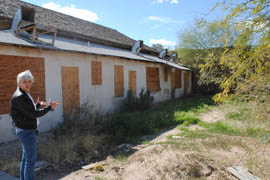[Source: Jessica Testa, Arizona Capitol Times] – A lawmaker’s attempt to have Arizonans decide whether to revive the voter–approved Heritage Fund is stalled in the House. HCR 2047, authored by Rep. Russ Jones, R–Yuma, earned unanimous approval from the House Agriculture and Water Committee in early February, but the chairman of the House Appropriations Committee has declined to hear it.
The measure could potentially reinstate the $10 million annually that the Heritage Fund provided to Arizona State Parks. The agency used the money to expand and improve its parks and provide grants to communities for trails, parks and historic preservation.
In 2010, lawmakers eliminated the Heritage Fund and reallocated the money to the general fund. Rep. John Kavanagh, R-Fountain Hills, said the bill wouldn’t be approved because the Legislature needs that $10 million for other natural resources funding, such as state trust land purchases and treatments to prevent forest fires. In addition, he said, the November ballot already has limited space. “The voters don’t like to see 20 or 30 ballot questions,” Kavanagh said. “We get criticized for that all the time. There has to be some triage.” Jones didn’t return phone calls seeking comment.
The Heritage Fund, established by voters in 1990, provided $10 million annually from the Arizona Lottery to the Arizona Game and Fish Department, which used the funds to promote recreation and environmental education and help endangered species, and $10 million to Arizona State Parks. The Heritage Fund was approved too early to fall under the 1998 Voter Protection Act, a constitutional amendment that prohibits the Legislature from reallocating voter-created funds.
“Voters fought for 20 years to protect this fund,” said Beth Woodin, president of the Heritage Alliance. “We’re doing everything we can in our waking hours to bring it back to them.” Woodin said Heritage Fund supporters are attempting to bypass Kavanagh, forming a committee of local political players and airing their concerns directly to House Speaker Andy Tobin, R–Paulden, and Senate President Steve Pierce, R–Prescott.
“The Heritage Fund has a huge economic impact,” she said. “For legislators who are cranking the line about job creation and community pride, this is something really positive to have on your resume.”
The Heritage Fund benefited groups such as Patronato Mission San Xavier del Bac in Tucson, which was granted $150,000 in 2007 to renovate its east tower. The grant was canceled before construction began. Now, with the building rapidly deteriorating, renovations could cost between $1.5 and 2 million, said executive director Vern Lamplot. “The longer it sits, the worse the condition of the east tower gets,” he said. “It’s a shame that voters passed this and legislators saw it fit to undo it.”
Woodin’s group has formed a political committee with members such as Grady Gammage Jr., lawyer and senior research fellow at Arizona State University’s Morrison Institute for Public Policy, and Richard Dozer, former president of the Arizona Diamondbacks. Heritage Fund supporter Lattie Coor, chairman and CEO of the Center for the Future of Arizona and former ASU president, said access to public space plays an essential role in the lives of Arizonans. “We have to stay attentive to that, protecting it and preserving it as the population continues to grow,” he said.
A House concurrent resolution would allow reinstatement of The Heritage Fund, which would help with renovations on buildings such as the Mission San Xavier del Bac in Tucson. Often called “White Dove of the Desert,” this building was founded in 1692. (Cronkite News Service Photo by Brittny Goodsell)


